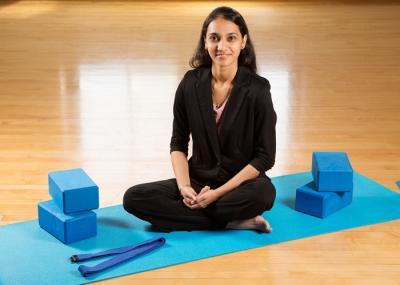The big reveal: it’s yoga.
Come Wednesday afternoon, do you struggle with the ability to maintain focus and take in, retain, and use new information? According to new research, it’s as easy as a single, 20-minute Hatha yoga session to markedly improve your focus.
Published in the Journal of Physical Activity and Health, the new research shows that participants perform significantly better immediately after a yoga practice than after moderate to vigorous aerobic exercise for the same amount of time—aerobic exercise has previously been shown to improve cognitive performance.
“Yoga is becoming an increasingly popular form of exercise in the U.S. and it is imperative to systematically examine its health benefits, especially the mental health benefits that this unique mind-body form of activity may offer,” says professor Edward McAuley, director of Exercise Psychology Lab at the University of Illinois at Urbana-Champaign, where the study was conducted.
“Yoga is an ancient Indian science and way of life that includes not only physical movements and postures but also regulated breathing and meditation,” says Neha Gothe, who led the study. The yoga intervention included seated, standing, and supine (lying down) yoga postures and regulated breathing. In contrast, aerobic intervention entailed walking or jogging on a treadmill at 60 to 70 percent of maximum heart rate for 20 minutes.
“It appears that following yoga practice, the participants were better able to focus their mental resources, process information quickly, more accurately and also learn, hold and update pieces of information more effectively than after performing an aerobic exercise bout,” Gothe says.
“The breathing and meditative exercises aim at calming the mind and body and keeping distracting thoughts away while you focus on your body, posture or breath. Maybe these processes translate beyond yoga practice when you try to perform mental tasks or day-to-day activities.”
Additionally, “Enhanced self-awareness that comes with meditational exercises is just one of the possible mechanisms. Besides, meditation and breathing exercises are known to reduce anxiety and stress, which in turn can improve scores on some cognitive tests,” she says.
Best of all? You can easily squeeze a 20-minute yoga sesh into your hour lunch break and reap all the benefits.
Image: University of Illinois graduate student Neha Gothe and her colleagues found that 20 minutes of yoga significantly improved participants’ reaction time and accuracy in tests of cognitive function. Gothe is now a professor of kinesiology at Wayne State University in Detroit. Credit: L. Brian Stauffer

